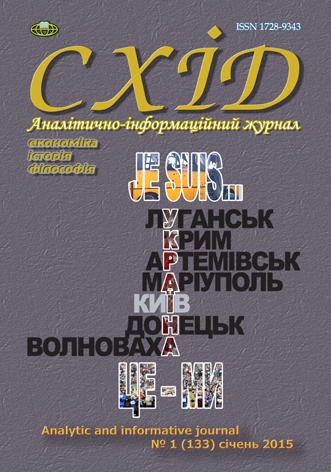The theory of co-separated relationship as the methodological basis of the definition of the category and the formation of public-private partnerships
DOI:
https://doi.org/10.21847/1728-9343.2015.1(133).47698Keywords:
public-private partnership, jointly-shared attitude, interests of the parties participating relationship public-private partnershipAbstract
The main methodological basis of the analysis of the essence, the economic content, mechanisms and contradictions in the development of PPPs is the theory of co-separated relationship. As for the relationship of PPP, the compatibility is the ratio of the combined financial, labor, intellectual and other resources for the joint implementation of projects, and are separated by property relations on the distribution of risks, as well as the preparation and assignment of benefits arising from the implementation of public-private partnership.
The role and importance of co-separated relationship manifests itself in the fact that, firstly, they contribute to the further development of the so-called mixed economy, states are responsible for the alliance with the private initiative in order to ensure a fruitful cooperation between the state and the private sector, where the resources of this sector combined with the state " interventions "aimed at achieving the objectives of which are not subject automatism of market mechanisms. Secondly, co-separated relationships cause a steady increase in the economic impact of the state, under the direct control and regulation which covers all the new activities.
Development of the system together, separated by a relationship confirmed by the development of corporatisation, the diversity of modern institutional forms and models of PPP, which are based on a combination of resources for the implementation of public-private partnership.Downloads
References
Frolov S. M., Yeremeichuk R. A. (2013), Ekonomika rozvytku, № 4, pp. 18-22 (ukr).
Filipova N. V. (2012), Visnyk Khmelnytskoho natsionalnoho universytetu, Vol. 1, № 6, pp. 258-262 (ukr).
Uzunov F. V. (2013), Investytsii: praktyka ta dosvid, № 15, pp. 133-135 (ukr).
Uzunov F. V. 2013), Investytsiyi: praktyka ta dosvid, № 17, pp. 113-115 (ukr).
Samoilikov O. Yu. (2013), Problemy nauky, № 11, pp. 23-28 (ukr).
Maisuradze M. Yu. (2014), Ekonomika ta derzhava, № 2, pp. 11-14 (ukr).
Manko N. N. (2011), Innovatsii ta investytsii, № 3, pp. 42-45 (ukr).
Dluhopolskyi O. V., Zhukovska A. Yu. (2012), Aktualni problemy ekonomiky, № 3, pp. 43-49 (ukr).
Hrytsenko A. A. (2003), Ekonomika Ukrainy, № 6, pp. 50-58 (rus).
Brailovskyi I. A. (2012), Naukovyi visnyk Poltavskoho universytetu ekonomiky i torhivli, № 1 (52), pp. 47-51 (ukr).
Smit A. (2007), The Wealth of Nations (translated),Moscow, 960 p. (rus).
Mill Dzh. S. (2007), Principles of Political Economy, Moscow, 1040 p. (rus).
Downloads
Published
How to Cite
Issue
Section
License
Copyright (c) 2015 Illia Brailovskyi

This work is licensed under a Creative Commons Attribution-NonCommercial-NoDerivatives 4.0 International License.
1. Authors bear responsibility for the accuracy of facts, quotations, numbers and names used.
2. Manuscripts are not sent back.
3. The publisher does not always agree with the authors' opinion.
4. The authors reserve the right to authorship of the work and pass the first publication right of this work to the journal under the terms of a Creative Commons Attribution-NonCommercial-NoDerivatives 4.0 International License. This license allows others to distribute (copy) the published work for non-commercial purposes, provided there is mandatory attribution to its authors and a link to the first publication in our journal.
5. The authors have the right to conclude separate supplement agreements that relate to non-exclusive work distribution in the form in which it has been published by the journal (for example, to upload the work to the online storage of the journal or publish it as part of a monograph), provided that the reference to the first publication of the work in this journal is included.

